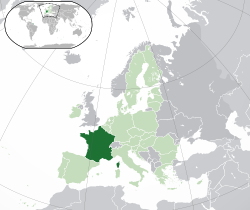This article needs to be updated. (December 2012) |
France has a rich selection of gold and silver commemorative coins. These coins are minted by Monnaie de Paris, which is a state owned industrial and commercial company. Monnaie de Paris has a distinctive different mark (the horn of plenty) guaranteeing "Monnaie de Paris's quality, origin and authenticity of its collector coins".[1] A second mark, representing the symbol of Master Engraver, Hubert Lariviere, which is engraved on their coins; the French horn, a few waves and a fish's silhouette.[1] Lariviere has since retired.
France | |
|---|---|
 |
Due to the large number of coins released every year, each set of coins, grouped by years, are being described on their own article as shown in the following list.
- Coins issued in 2002
- Coins issued in 2003
- Coins issued in 2004
- Coins issued in 2005
- Coins issued in 2006
- Coins issued in 2007
- Coins issued in 2008
These articles however, do not cover neither the French €2 commemorative coins nor the French franc commemorative coins. Also, other countries' euro Gold and Silver collections can be seen here.
- Different marks
-
Monnaie de Paris's seal of quality "horn of plenty".
-
current General Engraver Master's mark "French horn, a few waves and a fish's silhouette".
In May 2008, besides the shortage of one-ounce round blanks of silver at the U.S. Mint and the Royal Canadian Mint, the French Mint has confirmed that they will mint several 5, 15 and 100 euro coins in 2009. The Paris Mint and the national postal service said Tuesday that 5-euro and 15-euro coins will be available in silver while the 100-euro coin will be in gold.
Interesting enough, a further limited set of gold and silver coins will be issued by 2010, with the highest value a gold 500-euro coin was also recently announce by the French Mint.[2]
Notes
edit- ^ a b "Monnaie de Paris website". Archived from the original on 2008-05-05. Retrieved 2008-04-13.
- ^ "Paris Mint to release silver euros in 2009-2010 despite the shortage of silver blanks".
References
edit- "Monnaie de Paris". Archived from the original on 2008-05-14. Retrieved 2008-04-11.
- "Previous General Engraver Master's mark". Archived from the original on 2008-03-21. Retrieved 2008-04-13.
3."2002: Say hello to your new currency,[1].Archived from euobserver on 22 December 2020, retrieved 2024-03-02
- ^ "2002: Say hello to your new currency, the euro". euobserver. 22 December 2020. Retrieved 22 December 2020.

